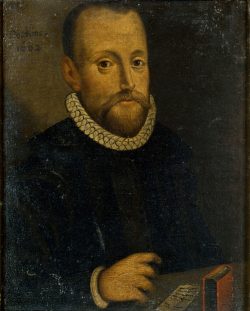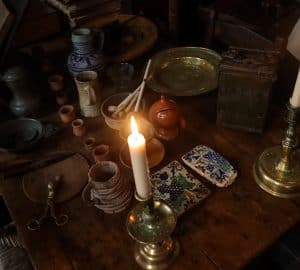One of the hottest topics in modern history is slavery. This has bled over into study of the Pilgrims, even though slavery never had the importance in New England that it did in the southern colonies. I’ve written a bit on a slavery related claim before, but today I came across a quote that illuminates their theology of slavery. It is from the writings of William Perkins. He was not a Pilgrim, but was a leading Puritan theologian of the previous generation. William Bradford owned Perkins’ works, and although we can not say that Bradford shared his views, they are useful considering the a paucity of other evidence.

William Perkins discussed slavery in his book Christian Oeconomie.1 Historians tend to draw a sharp line between temporary hired servants and permanent slaves, or bondservants. Perkins treated them as just two different types of servants, but also spent a lot of his space particularly addressing bondservants. He argued that slavery is justified because, “God has ordained and allowed it, even by warrant of His own law. … [T]hose who are overcome in war may be held captive, and it is lawful for the conqueror to kill them, and therefore to make them slaves. And if, being taken, they owe all that they have to them by whom they are saved.” He notes that in scripture the godly held slaves, and the “apostles do not disallow of such servants, but command them, being servants, and called to the profession of Christianity in that state, not to change, but to abide in their calling.” He said slavery is against the law of nature, but that after the fall “it is not against the law of corrupted nature.” But he did not embrace the idea that some nations or races were born destined for slavery, saying “servitude proceeds not of nature, but has its original from the laws of nations, and is a consequence of the fall. For all men by nature are equally and indifferently free, none more or less than others.” Christ purchased liberty, but only for believers. Ultimately though, he said that “where this kind of servitude is abolished, it is not to be again received or entertained among Christians, especially considering [that] it is a far more mild and moderated course to have hired servants.”
He also gave seven caveats, or limitations, on the power of masters over their bondservants:
“(1) The master has not over his servant the power of life and death, for this takes away the lawful power of the magistrate, to whom alone the Lord has committed the sword of justice.
(2) There is not liberty granted him to use his servant at his own will and pleasure in all things …. [References in Exodus 21:26 where a slave was to be freed If loosing an eye or tooth.]
(3) The power is not enlarged to the command of things against piety or justice; for in these cases a man must rather obey God than man (Acts 4:19).
(4) Masters do not take liberty or make separation of their servants who are married … or of those who are parents from their children, considering that God Himself has made these societies….
(5) Masters do not take liberty to put over their servants to ungodly or unbelieving masters, for that is an unkind and cruel liberty, and may be an apparent occasion to make the servants fall away from religion and renounce the true God.
(6) They do not bind them to perpetual slavery and never make them free. [Exodus 21:5]
(7) The servitude is not procured or retained by force, for it is a more grievous crime to spoil a man of his liberty than of his riches.
As we have said, without other evidence we cannot positively know whether or not Bradford agreed with these views, but they are still helpful in understanding the position of the theological tradition he came from.
1. All following quotes are from The Works of William Perkins by William Perkins, etd. Joel Beeke and Derek Thomas (Grand Rapids, MI: Reformation Heritage Books, 2020), vol. 10, p. 186-188.




